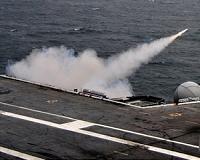| . |  |
. |
Moscow (UPI) Aug 2, 2010 Russia has denied providing S-300 missile system to Azerbaijan. Last year Russia became the world's second-largest arms exporter after the United States and one of Rosoboronexport's, Russia's governmental arms export agency's most popular items after aircraft and warships is the S-300 anti-aircraft system. A high-ranking official at the Russian Defense Ministry, speaking on condition of anonymity, denied that the system was delivered to oil-rich Azerbaijan, a former Soviet republic on the Caspian Sea. The official told Russia's Interfax -- Agenststvo Voennykh Novostei: "At present supplies of Russian S-300 systems to Azerbaijan are not possible. First and foremost, for political reasons. Bearing in mind the difficult relations between Baku and Yerevan, exporting S-300 systems to Azerbaijan would certainly upset the balance of power in the region. "Besides, Armenia is Russia's ally in the Collective Security Treaty Organization and Yerevan might regard such arms contracts between Moscow and Baku as a betrayal." Analysts have speculated that Azerbaijan could be a launch point for any Israeli or U.S. aerial attack on suspected Iranian nuclear facilities. Russia's arms export agency, Roobornexport, enthusiastically describes the system on its Web site: "The S-300V surface-to-air missile system is designed to provide all-weather defense for vital front- level and rear facilities, country's administrative and political centers from various air attack weapons in a severe clutter and jamming environment of the modem warfare. "The system comprises a command post, a sector scanning radar, an all-round surveillance radar, a multi-channel missile guidance radars (up to four), two types of launchers (up to 24), two types of loader-launchers (up to 24), SAMs (two or four for each launcher and loader-launcher)." Controversy over the past few years has repeatedly swirled around proposed Russian exports of the S-300 system to potential clients such as the Turkish Republic of Northern Cyprus and Iran, reported to defend the Bushehr nuclear station being completed by Russian specialists. The S-300s operational range extends to 100 miles, further than other Russian systems such as the Strela-10, Tunguska, Osa, or Tor, while the range of target detection by individual stations is up to 200 miles. According to a recent interview in the Russian military press Air Defense Moscow Military District surface-to-air missile brigade Lt. Col. Oleg Soshnikov:, "It takes about 15 seconds to prepare the missile itself, with 35 seconds remaining. In that time the battery commander has to detect the target and report to the battalion commander, and the latter must make the decision and give the command to destroy the target, and the crew chief has to push the 'launch' button." While Russia seeks to expand its share of the global arms market pie, the West regards its export efforts of advanced into troubled areas of the world as a source of potential destabilization, unlike its own efforts.
Share This Article With Planet Earth
Related Links Learn about missile defense at SpaceWar.com All about missiles at SpaceWar.com
 Vinson Uploads And Launches Missiles For Qualifications
Vinson Uploads And Launches Missiles For QualificationsUSS Carl Vinson, At Sea (SPX) Jul 29, 2010 USS Carl Vinson (CVN 70) uploaded and launched Evolved Sea Sparrow Surface Missiles (ESSM) and Rolling Airframe Missiles (RAM) July 16 and 17 to support Combat Systems Ship's Qualification Trials (CSSQT). This is the first time Vinson has had missiles on board since the completion of a five-year refueling complex overhaul. "It's part of the qualifications for Combat Systems to test i ... read more |
|
| The content herein, unless otherwise known to be public domain, are Copyright 1995-2010 - SpaceDaily. AFP and UPI Wire Stories are copyright Agence France-Presse and United Press International. ESA Portal Reports are copyright European Space Agency. All NASA sourced material is public domain. Additional copyrights may apply in whole or part to other bona fide parties. Advertising does not imply endorsement,agreement or approval of any opinions, statements or information provided by SpaceDaily on any Web page published or hosted by SpaceDaily. Privacy Statement |